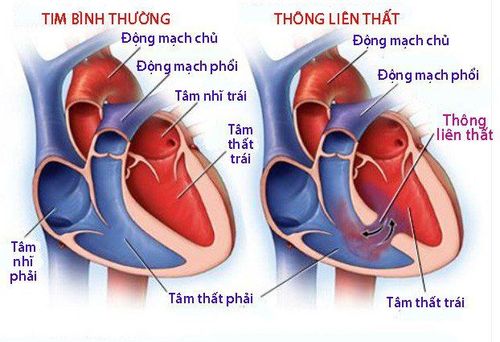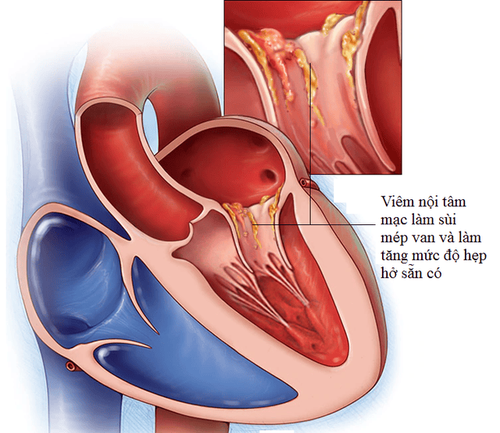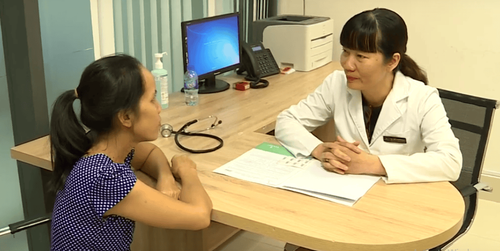This is an automatically translated article.
The article is professionally consulted by Cardiology & Thoracic Surgery doctors - Cardiovascular Center - Vinmec Central Park International General Hospital.Ventricular septal defect accounts for 15-20% of all congenital heart disease cases. Ventricular septal disease affects children's health and comprehensive development with many dangerous complications such as growth retardation, congestive heart failure, lung infection, pulmonary hypertension... and possibly death. death if not treated promptly.
1. What is ventricular septal defect?
Ventricular septal disease, also known as VSD for short, is the most common form of congenital heart disease today.
In the human body, the two main ventricles are two chambers in the lower part of the heart and they are separated by a septum. In which the left side of the heart will normally pump blood with strong pressure and contain more oxygen (than the right side) to the aorta to feed the whole body. A ventricular septal defect is the existence of one or more holes in the septum between these two ventricles. If the hole is large, it can cause heart failure, irreversible lung damage and death.
2. What are the symptoms of ventricular septal defect?
Symptoms of a baby's ventricular septal defect usually appear days and weeks after birth. An infant with a small ventricular septal defect will have no symptoms. Children with large foramen long-term may cause cyanosis of the lips and fingernails due to lack of oxygen, clubbing fingers and toes due to black blood from the right ventricle passing through the hole mixed with red blood on the left ventricle (Eisenmenger syndrome).
Symptoms of ventricular septal defect in children include:
Skin, lips and fingernails are always in a cyanotic state due to lack of oxygen. Eating poorly, not gaining weight. Your baby is breathing fast, has difficulty breathing, or has trouble breathing. The baby is always tired and weak. Baby has trouble breathing when eating or when crying. Your baby's legs, feet, or belly are swollen. Fast heartbeat or irregular heartbeat.
3. Causes and complications of ventricular septal defect in children
Ventricular septal defect in children often has no obvious cause, possibly due to abnormalities in the baby's heart development in the fetus. During pregnancy, maternal infection with rubella virus, diabetes, drug, alcohol, or other stimulants are considered causes of congenital heart defects. Complications of ventricular septal defect in children include:
● With small ventricular septal defect, there are rarely complications, children still live and develop normally.

Thông liên thất gây ra nhiều biến chứng nguy hiểm
Large ventricular septal defect has many dangerous complications such as: Malnutrition: malnutrition is often accompanied by heart failure, recurrent infections, poor diet. Pneumonia: recurrent lung infections with clinical manifestations such as fever, cough, shortness of breath, tachypnea, intercostal muscle contraction, chest retraction, loss of appetite. Congestive heart failure: Due to increased blood flow through the right heart, to the lungs, the heart has to work harder than usual. Over time, the heart dilates, constricts blood and cannot pump blood effectively, unable to meet the blood needs of the body's organs. Symptoms of heart failure due to ventricular septal defect in infants such as shortness of breath or sweating during feeding or exertion, rapid breathing, labored breathing, and moaning even at rest. Severe pulmonary hypertension with Eisenmenger syndrome Other complications such as arrhythmias, cerebral embolism or brain abscess.
4. Treatment method for ventricular septal defect
The progression of ventricular septal defects is very diverse. Therefore, the treatment will need to be based on factors such as: hemodynamics, age, anatomical lesions, pulmonary artery pressure, the patient's response to internal therapy.
Currently, there are two main methods of ventricular septal defect treatment: open heart surgery and interventional closure of the ventricular septal defect.
Currently, FDA (US Food and Drug Administration) only allows percutaneous ventricular septal closure in patients with small muscular septal defect, apex or after complications of myocardial infarction. heart .
Indications to close the hole by open-heart surgery depend on the location, size of the hole, the patient's failure to respond to medical treatment, or other congenital heart disease.

Điều trị thông liên thất tại Vinmec
Cases after surgery, without surgery or without surgery need to prevent complications of infective endocarditis.
Treatment of ventricular septal defect has the ability to completely cure the disease if it is detected early and has an accurate treatment regimen at reputable medical facilities. Vinmec International General Hospital has a Cardiology Center with a specialist in pediatric cardiology that undertakes the functions of examination, ultrasound, diagnosis, monitoring, treatment and cardiac rehabilitation for pediatric patients.
The department has successfully conducted many heart surgeries including in children under 5 kg and newborns with cardiovascular defects, including ventricular septal disease. The pediatric cardiology department of Vinmec hospital has a team of experienced and reputable experts in medical, surgical and interventional cardiology by applying the most advanced techniques today in diagnosis and treatment. treatment of cardiovascular diseases.
The Faculty has comprehensive cooperation links with the Cardiology Institute of Bach Mai Hospital, Paris Decartes University of Georges Pompidou Hospital (France), University of Pennsylvania (USA)...
Please dial HOTLINE for more information or register for an appointment HERE. Download MyVinmec app to make appointments faster and to manage your bookings easily.













